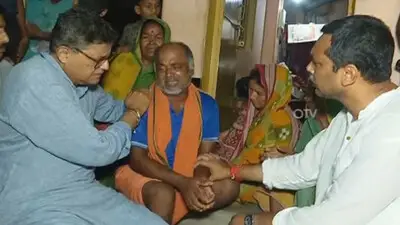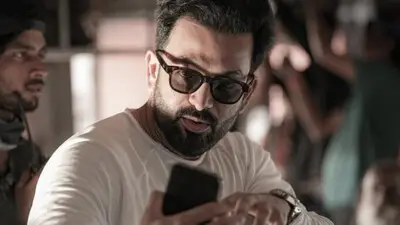Recommended Stories
Mumbai: Nurse Aruna Ramchandra Shanbaug, who lay in coma for 42 years, the longest in world history, died here on Monday. Her death triggered an outpouring of grief through the day and at her funeral in the evening.
The last rites were performed at Bhoiwada Crematorium in south Mumbai here this evening, officials said.
Shanbaug had been in a vegetative state since she was brutally raped anally by a contract sweep in the KEM Hospital on the night of Nov. 27, 1973.
Shanbaug, aged 67, was deserted by most of her relatives during her lifetime but was looked after with unwavering dedication by the nurses of Asia's largest public healthcare facility, the BMC-run hospital's Ward No. 4A.
Since nearly a week, Shanbaug had suffered from pneuomonia-related ailments and had difficulty in breathing following which was put on a ventilator and was responding to the treatment.
She breathed her last around 8.30 a.m., plunging the entire hospital into a pall of gloom, especially the nursing staff who idolized her, hospital dean Avinash Supe.
Then aged 25, Shanbaug was brutally raped by contract sweeper boy Sohanlal B. Walmiki in the same hospital when she was changing prior to proceeding on long leave for her impending marriage with a young doctor in the hospital, Sandeep Sardesai.
While indulging in the gruesome act, the assailant choked her with a dog leash chain which cut off oxygen supply to her brain. This resulted in severe injuries to the brain stem and cervical chord injury and she lapsed into a permanent vegetative state - till her death on Monday.
The next morning, Shanbaug was found bleeding and in a delicate state, around 10 hours after the attack, by a conservancy staffer and rushed to the hospital for treatment.
Later, the police registered a case of robbery and attempt to murder as the hospital authorities allegedly suppressed the anal rape perpetrated on her to avoid her social ostracism and the fact that she was planning to get married soon.
Walmiki was arrested and convicted to serve two concurrent seven years terms. He was later set free and is believed to be settled in Delhi since.
"She was a bright student, always of a very helpful nature… going out of the way to help her co-students. The incident happened just when she was planning to settle down in life, both personal and professional. The perpetrator got away with minor punishment but suffered all her life," her former teacher at the KEM Nursing College, Anant Gaitonde, told IANS in a choked voice.
In Jan. 2011, the Supreme Court took up hearing a euthanasia petition filed on Shanbaug's behalf by celebrity author and journalist Pinki Virani in December 2010.
Though the apex court turned down Virani's petition in March 2011, in a landmark order, it permitted 'passive euthanisia' in India.
The Supreme Court also specified guidelines for passive euthanasia, including withdrawal of treatment or food that was allowing a patient to survive.
Virani, who authored the best-seller biography, "Aruna's Story", said though Shanbaug was comatose for over four decades, she gifted the country with the historic right of passive euthanasia.
On Monday evening, Shanbaug's flower-bedecked body was taken from the hospital - her solitary home since the past over four decades - in an ambulance to the crematorium.
Thousands of grieving nurses, including many who had personally cared for her all these years, raised cries of 'Aruna Amar Rahe' and 'Aruna Ki Jai Ho', as they walked to the funeral venue.
Prior to the funeral, her body was kept for public viewing as thousands of nurses, political leaders, commoners and others paid homage to her.
Earlier in the afternoon, a minor controversy erupted over the funeral, with two relatives of Shanbaug and the hospital nurses staking claim to perform the last rites.
However, the matter was settled amicably with the hospital administration taking over the responsibility for the funeral and the last rites got underway in the presence of the nurses as well as Shanbaug's relatives.












